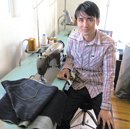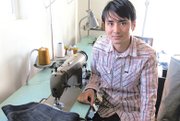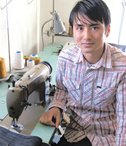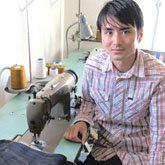Railcar: Premium Denim From a Railway Mechanic
At night, Steven Dang can be found on railroad tracks fixing commuter rail cars on the Metro Gold Line, which runs between downtown Los Angeles and Pasadena, Calif. Mornings, he and girlfriend Tawny Ortiz construct men’s fashion label Railcar Fine Goods in a workshop in their home. Without any formal fashion training, these two have scored a coup for those living by a do-it-yourself creed. They placed their denim and shirting line in high-profile Los Angeles boutiques American Rag CIE World Denim Bar and Glory Sales & Service.
For Dang, the leap from light-rail mechanic to fashion designer might seem unlikely. However, he considers making clothes a close cousin of another one of his big obsessions, taking apart and rebuilding cars and motorcycles. “I think we’re building clothes,” Dang said. “Every thread has a function.”
The direct link between restoring cars and building clothes can be found in a workshop in his tract home in El Monte, 15 miles east of downtown Los Angeles. Dang restored vintage sewing machines, such as the Union Special triple-needle chain stitch that sits in his workshop. He developed an interest in the machines after visiting apparel factories in 2002 when he was helping friends launch a now-defunct contemporary jeans line.
He scoured Southern California for parts for vintage sewing machines and used them to take apart jeans and put them together again. Fast forward to January 2010, and he debuted Railcar Fine Goods. The look and feel of the denim is inspired by workwear jeans of the mid-20th century, but the fit and silhouette are contemporary.
The Railcar Fine Goods collection centers around the tapered-cut selvedge jean called “Spikes,” which is available in eight styles. Railcar also offers plaid shirts called “Moto Flannel” and some Western shirts. Glory manager/buyer Mike Burns said he has reordered the shirts several times because of the high level of detail and craftsmanship. “The patterns are vintage and authentic. He personally oversees the shirts he makes,” Burns said of Dang. According to Burns, Glory customers are typically willing to pay $20 to $30 extra for a garment if it is made in America, which is an added boon for Railcar.
Dang makes samples and trim in his El Monte house. However, for his typical 300-piece production runs, he has them made in factories in Los Angeles. For the near future, Dang and Ortiz plan to keep Railcar as a small design house. Their next stop might be opening a small boutique with a design workshop in the back. Wholesale price points for the jeans run from $65 to $90. For shirting, wholesale price points are $40 to $50. For more information, call (626) 823-0488 or e-mail steven@railcarfinegoods.com.—Andrew Asch

























